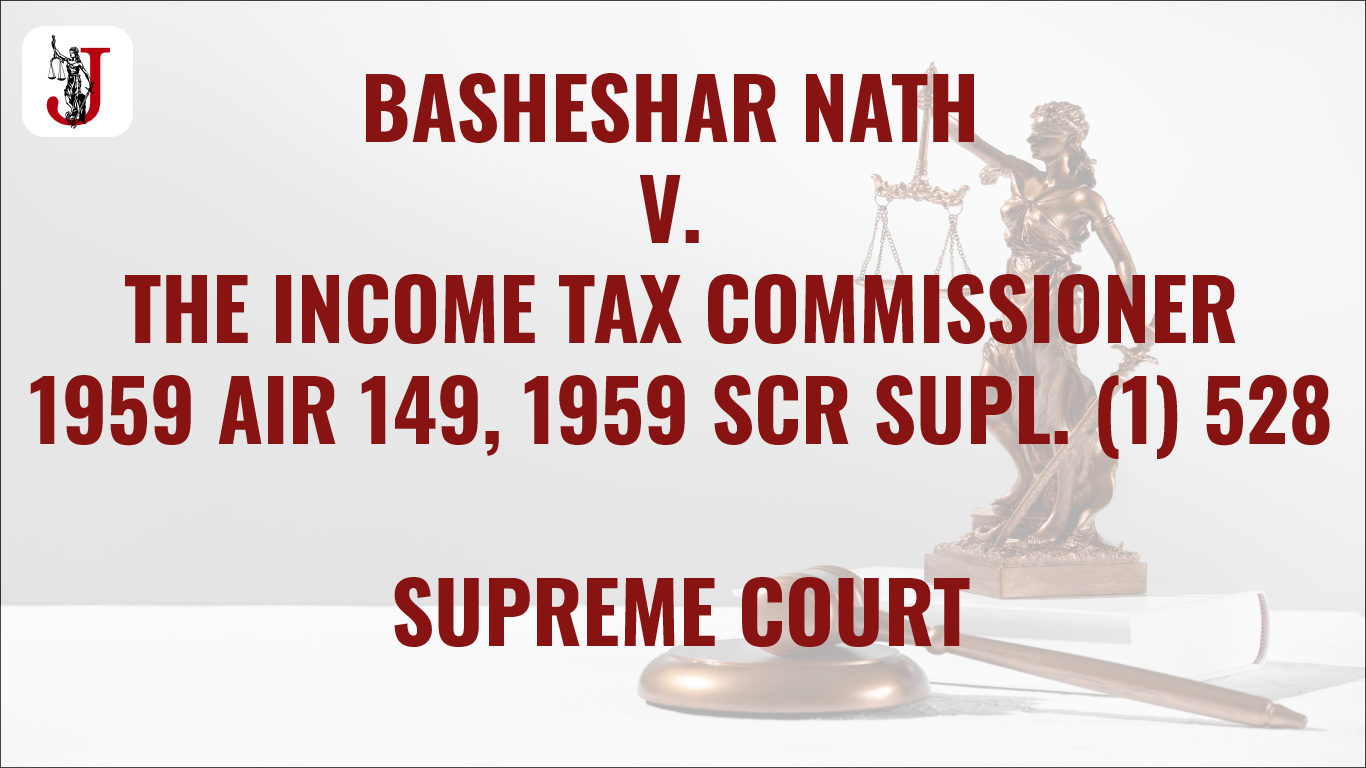1959 AIR 149, 1959 SCR SUPL. (1) 528
Introduction
At first, we have to know about waiving a right, which means a person can no longer use his right and is excluded from challenging the constitutionality of that law.
The doctrine of waiver, as defined by Black’s Law Dictionary, is the intentional or voluntary relinquishment of a known right.
Waiver is when a person, intentionally and with full knowledge, gives away his right to exercise, which the person would possess.
An individual possesses certain legal rights that are conferred upon him either by the constitution, a statute, or a contract.
The doctrine of waiver is based on the principle that a person is the best judge of his own interests and has full knowledge about his rights, so that person should be allowed to decide for himself.
Facts
The appellant, Basheshar Nath, tries to escape income tax liability, so he applied to the Commission for a settlement of his case, agreeing to pay by way of tax and penalty at the concessional rate.
The Central Government agreed with it.
But the appellant is challenging the validity of the settlement made under s. 8A of the Act on the ground that S. 5(1) of the Act is violative of the fundamental rights of the constitution and refuses to pay the amount to which he agreed with the Commissioner of Income Tax.
Issue
The main issue in this case is whether a waiver of fundamental rights is possible.
Respondent’s Argument
The respondent in his favor contended that in settlement, the appellant had waived his fundamental right in his own will, so the appellant cannot challenge this now.
Judgement
The Supreme Court held that “we think that the rights described as fundamental rights are a necessary consequence of the declaration in the preamble that the people of India have solemnly resolved to constitute India into a sovereign democratic republic and to secure to all its citizens justice, social, economic, and political; liberty of thought, expression, belief, faith, and worship; equality of status and of opportunity.”
The Supreme Court said that such waivers have evolved from judicial interpretation in the United States, but in the Indian scenario, it was upheld that fundamental rights cannot be waived.
It was explained in this case why the doctrine of waiver does not apply to the Indian Constitution, as Justice Bhagwati remarked, “…Ours is a nascent democracy, and situated as we are, socially, economically, educationally, and politically, it is the sacred duty of the Supreme Court to safeguard the fundamental rights that have been for the first time enacted in Part III of our Constitution…”
So the Supreme Court said that according to Indian constitutional spirit and public policy, no fundamental right could be waived.
Conclusion
In conclusion, it can be said that a waiver of fundamental rights is not suitable for Indian society because only a small number of people in the country are fully aware of their rights and duties. If the doctrine of waiver is applied in Indian society, many innocent people will be forced to lose their fundamental rights.
Youtube facebook whatsapp web weather translate google amazon gmail google translate Instagram cricbuzz traductor Hotmail restaurants satta king tiempo twitter googel maps Yandex Sarkari result clima hotels fb yahoo maps chatgpt yahoo mail weather tomorrow Netflix roblox nba wordle tradutor livescore premier league ibomma speed test canva pintrest outlook Instagram login omegle flipkart myntra paypal paytm Alibaba ebay lottery sambad linkedin tiktok shein bbc news real madrid gmail login Walmart ikea cricket snaptik flashscore English to hindi twitch google scholar Barcelona Sarkari Naukri matrimonial shadi lgbtq third gender woman children Advocate barrister vakil supreme court high court commissioner exams ll.b ll.m ugc net law ph.d. m.b.a. graduation degree certificate school additional session judge civil judge justice jurists crime criminology punishment capital sentence death warrant fine constitution of india criminal procedure code civil procedure code evidence act sale of goods act arbitration act all india bar exam lower judiciary higher judiciary additional district attorney contract act amendment act u.s. constitution Canada p r section article schedule judgment vacancy post Porsche louis Vuitton chanel Gucci Hermes dior cartier rolex titan tiffany & co Ferrari estee lauder coach lancome burberry prada omega yves saint Laurent Lamborghini ray-ban Armani Moncler tata reliance Givenchy celine Bentley tag Heuer sk-II can cleef & arpels bulgari Shangri-la lao feng xiang dabur baidyanath cipla birla monte carlo loewe rolls-royce bottega-veneta jaege-leCoulture Maserati valentino dolce & gabbana Salvatore Ferragamo sulwhasso tom ford Maruti Suzuki Hyundai kia intercontinental Tissot aston martin ysl beauty fendi Versace kenzo la mer longines gold price sensex human rights pollution
